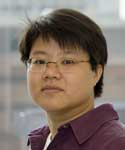
 |
Deb Hung Laboratory DEB HUNG, MD, PhD
DEB HUNG, MD, PhD
http://ccib.mgh.harvard.edu/hunglab.htm Seventh floor 185 Cambridge Street Boston, MA 02114 phone: fax: About Deb Hung Deborah Hung is a physician-scientist combining chemical and genomic approaches to define host-pathogen interactions and to reveal the critical pressure points of infectious disease. By deploying small organic molecules on a genome-wide scale to both perturb and understand bacterial infection, she hopes to identify new therapeutic prospects for a variety of devastating pathogens, including Vibrio cholerae, Pseudomonas aeruginosa and Mycobacterium tuberculosis. Deborah received her Ph.D. in chemistry from Harvard University, where she worked in Stuart Schreiber's laboratory to characterize the chemical and biological properties of discodermolide, a small molecule isolated from marine sponges that stabilizes microtubules. Deborah received her medical degree from Harvard Medical School and completed a residency in internal medicine and fellowships in infectious disease and critical care medicine at Brigham and Women's Hospital and Massachusetts General Hospital. She holds positions as an infectious disease physician at Brigham and Women's Hospital and Massachusetts General Hospital and an attending critical care physician in the Medical Intensive Care Unit at Brigham and Women's Hospital. Research The goal of research in the Hung Lab is to understand in vivo mechanisms of bacterial pathogenesis by studying pathogen-host interactions. By merging the fields of chemical genetics and bacterial genetics/genomics, we hope to provide insight into possible new paradigms for addressing infectious diseases. Despite recent, largely genetic, technical advances in the field of in vivo pathogen-host interactions, many important questions related to the mechanisms of bacterial pathogenesis remain unanswered, in part because of the inability of in vitro conditions to accurately mimic in vivo ones. The newly developing field of chemical genetics offers a novel and promising approach to studying these mechanisms, thus complementing traditional genetic studies. Chemical genetics uses small, organic molecules as specific tools to conditionally induce a phenotype by activating or inhibiting specific protein targets, thus allowing the manipulation of relevant pathways in vitro and in vivo, on very short time scales. In concert with taking a chemical biological approach to pathogenesis, our lab is interested in developing powerful genomic approaches to systematically and comprehensively identify all bacterial genes required for infection and to facilitate rapid identification of small molecule targeted pathways and interactions. Using small molecules that we identify and develop from high-throughput, forward phenotypic screens and arrayed, knockout libraries of different pathogens, including Vibrio cholerae, Pseudomonas aeruginosa and Mycobacterium tuberculosis, we hope to identify new approaches to disease intervention. Lab Members John Aquadro Research TechnicianAnne Clatworthy, PhD Research Fellow Jim Gomez, PhD Research Scientist Sarah Grant, MD Research Fellow Erik Hett, PhD Research Fellow Ben Kauffman, PhD Research Fellow Admire Kuchina Technician Jenny S. W. Lee Research Associate Mark Leibman, PhD Research Fellow Kathryn Levasseur Graduate Student Kevin Mark Research Technologist Emily Pearson Lab Manager Louise Slater Graduate Student Elesha Smith Administrative Assistant Sarah Stanley, PhD Research Fellow Yajie Wang, PhD Research Fellow Carl Wivaag Graduate Student Desiree Yang Graduate Student |
|||||||||||
| copyright © 2008 mgh | |||||||||||